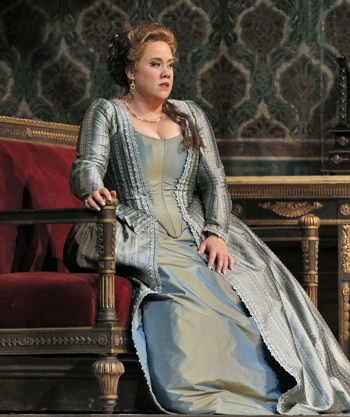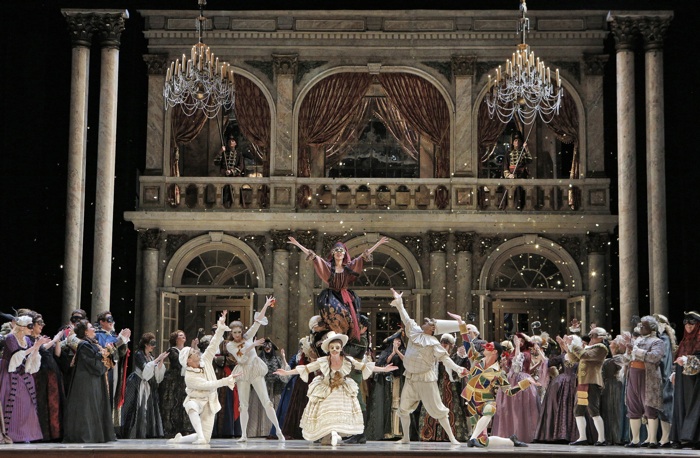Swedish politics, Italian style?
The San Francisco Opera revived their 2006 production of Un Ballo in Maschera (A Masked Ball) with lavish costumes, grandly Italianate sets, and moody lighting. The SF Opera Orchestra, conducted by Nicola Luisotti, rendered the quick-shifting moods of Verdi’s steamy potboiler, based on a true assassination, with panache.
And what a potboiler! Setting a serene field, violin plucks and woodwind questions gave way to warm cello phrases. Gradually, they built the main motive and then faded away into a male chorus, with beribboned courtiers in an ornate and colonnaded royal hall singing of their loyalty to the crown.
 But this Garden had two disquieting notes. “A conspiracy brews in the shadows,” warned baritone Thomas Hampson as Anckärstrom, King’s counselor, with a list of courtiers plotting against the throne. Playing a rather placid King Gustavus III of Sweden, Ramón Vargas tossed the papers back, protesting, “I do not want to know their names, for then blood will be shed.” Rather, he hoped for the influence of his good deeds. Hampton’s reply, “Hatred is quicker than love to strike at its victim,” set the dramatic hook.
But this Garden had two disquieting notes. “A conspiracy brews in the shadows,” warned baritone Thomas Hampson as Anckärstrom, King’s counselor, with a list of courtiers plotting against the throne. Playing a rather placid King Gustavus III of Sweden, Ramón Vargas tossed the papers back, protesting, “I do not want to know their names, for then blood will be shed.” Rather, he hoped for the influence of his good deeds. Hampton’s reply, “Hatred is quicker than love to strike at its victim,” set the dramatic hook.
The other disquieting note was when Gustavus tried to get his best friend’s girl.
And so the business of politics was soon colored by lust and discolored by jealousy, a brew that slowly gained potency throughout the drama until Verdi had us sitting on the edge of our seats.
And like the character driven tragedies of Shakespeare or the chorus of the ancient Greeks, Verdi creates his tragedy with the inexorability of a train wreck. He personifies the Fates with the seer Ulrica, who, like Elektra, is fated to be disbelieved. Dolora Zajick, a marvelous alto, sang the part of Ulrica with fine conviction. Eyes bulging as she stirred her cauldron and called on the fiery embrace of the devil, she sent a shiver down the spine of more than a few opera goers. I well recall her in her last role here at the SF Opera, as Azucena, the vengeful witch of Verdi’s similar opera, Il Trovatore. Actually, that was even scarier!
The drama delivered, and that in spades.
And this is what Verdi does. He is a craftsman of the familiar, with simple motives reappearing on shifting ground to intensify a moment. His music is often the inner voice of a character, completing that careful symbiosis between drama and orchestration. In Un Ballo in Maschera, written after the wild successes of Rigoletto, Il Trovatore and La Traviata, Verdi “paints” his characters: Amelia’s torment is also that of a cello, Anckärstrom girds himself with horn volleys and then reminisces of happier days along with flute. And Gustavus debates duty and honor against the soulful viola.
There were unexpected highlights and a few flaws in this performance. Although Hampson’s acting was gripping, his voice lacked the vigor of his youth. And Vargas, a go-to tenor for principal roles, tended towards a stand-and-deliver approach, what they call in the industry “park and bark.”
But soprano Heidi Stober was far more active in her “pants role” as the King’s page, with high acrobatic vocals and dynamic acting. And Efraín Solís (of recent Hydrogen Jukebox fame here at West Edge Opera) sang in an effortless baritone that made the others sound like they were working too hard. Also two excellent young basses, Christian Van Horn and Scott Conner, made the “Ha, ha, ha” aria zing.
Most surprising, dramatic soprano Juliana Di Giacomo was the real thing in the starring role of Amelia, with a soaring “Miserere” and compelling soft notes.
Verdi had a lot of trouble getting this work performed. It was closely based on the real assassination of Gustavus III of Sweden by his trusted advisor, an act of cold-blooded politics. Being Italian – and an excellent dramatist – Verdi added a tangle of love, vengeance and jealousy but still couldn’t get it past the Italian censors, who didn’t want a King murdered onstage. Verdi, a staunch Republican (which back then still referred to the public) wanted to present an opera about politics and cabals. But first he had to change the setting to Poland, and later to Boston, to get it aired. The SF Opera’s version, as most these days, returned us to the original Swedish setting.
We are now entering our own heated political season. And while they don’t murder Kings very often, they’ve gotten very good at slinging mud, gerrymandering, buying elections and trying to keep us from voting.
Make Verdi proud. Vote!
“A Masked Ball” has three more performances at the War Memorial Opera House: Thursday, Oct. 16 at 7:30 p.m., Sunday, Oct. 19 at 2:00 p.m. and next Wednesday, Oct. 22 at 7:30 p.m. Also playing concurrently is Handel’s Partenope, starring countertenor David Daniels and the incomparable and lovely Danielle De Niese. More at sfopera.com.
—Adam Broner
Photo top of Juliana di Giacomo as Amelia, and below, the SF Opera Chorus and dancers. Photos by Cory Weaver.

